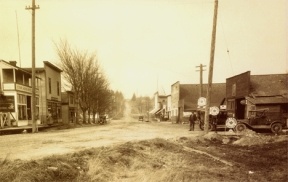Staff to research strain on city employees and financial impact
LANGLEY — Langley council members have asked the city to take a close look at how much it will cost the city to get a historic preservation program up and running.
Councilman Bob Waterman, the chairman of the council’s historic preservation committee, introduced a draft historical preservation ordinance to his fellow council members Wednesday.
He also talked about the work volunteer historians have done so far in surveying the city.
“With all the development coming along in Langley right now, it’s time to look at the past,” Waterman said.
While the Langley City Council is enthusiastic about a historic preservation program, it has also asked its staff to explore what the fiscal and staff impact would be to support such an effort.
The council formed a historic preservation committee in April to begin preliminary work and take a look at what “historic” means for Langley, Waterman said.
The draft ordinance lays the groundwork for Langley to become a “certified local government” which would allow the city to tap into financial resources and assistance with historic preservation.
It would also identify local properties eligible for special property tax breaks.
Under the new ordinance, commercial structures such as the Dog House and the Clyde Theatre could be registered as historic in addition to some homes and views.
“There have been suggestions that there are some people in town that ought to be preserved,” Waterman joked.
Only local preservation programs have regulatory power. Even though the Dog House was placed on the National Historic Registry, and though the 1902 building that houses the historic museum in Langley is recognized as a historic site by the county, the titles are purely honorary.
Waterman said the committee has set some guidelines for what it will take for structures and sites to be considered historic, though.
Structures must be of historic value and reflect Langley’s cultural heritage. Buildings must have integrity and be at least 50 years old.
When Waterman and his volunteer crew began surveying Langley, he said they only looked at sites built in 1940 or before.
Langley’s historic registry would be voluntary, Waterman said. Owners could place a sign on their buildings marking them as historic sites, but they would also have to agree to go through a review process if they would want to undertake significant alterations.
The ordinance is based on a ordinance used by the state, but has been tailored to fit Langley’s needs.
“The two issues that are key here are establishing a Langley Historic Commission and a Langley Historic Registry,” Waterman said.
The commission would have seven members and four of them would have to have professional credentials in a field such as architecture, history or construction.
One city staff member would serve on the commission. The commission would review changes to historic sites and would have the final say on what buildings get recognized.
“Anybody can nominate a site, but the commission decides,” Waterman said.
City planner Larry Cort, who has experience working on Coupeville’s historic preservation program, said staff will have a report ready in October.
If the council concludes that the city can handle administering the program, the ordinance could go to the council before the end of the year.
Michaela Marx Wheatley can be reached at 221-5300 or mmwheatley@southwhidbeyrecord.com.



